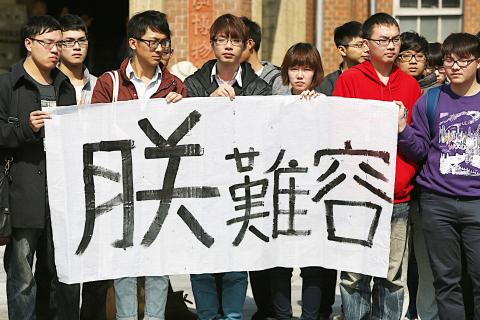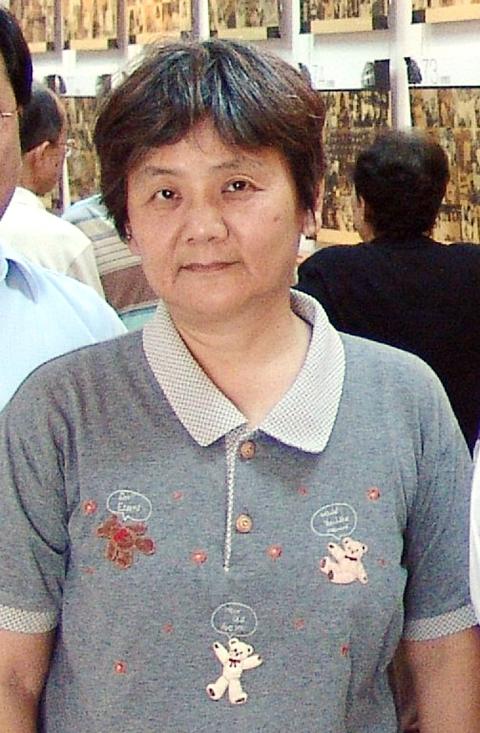History professor Wang Wen-hsia (王文霞) at National Cheng Kung University (NCKU) yesterday apologized for her remarks this week about the late activist Deng Nan-jung (鄭南榕), but that did not stop academics and students from urging the university to name a plaza on its campus after the democracy pioneer, as students had voted to do.
In a statement issued via the school, Wang apologized twice for not being able to make herself clear on Tuesday when expressing her opposition to the plaza being named “Nan-jung Square” (South Banyan Square, 南榕廣場), “due to time constraints” and for “disturbances caused to society” by the remarks.
“I did not say that Deng Nan-jung was a terrorist. The analogy [between Deng Nan-jung and] Islamist bombers was drawn when I was talking about how people deal with problems in life,” Wang said in her statement.

Photo: CNA
Wang said she meant to say young people must work hard and treasure life when facing hardship, since “I do not approve of coping with life’s challenges in such a radical way.”
The professor, specializing in 19th century and 20th century European history, said she held Deng and many other people in very high regard for their various contributions to Taiwan’s democratic development and had no intention to vilify Deng.
Wang said she did not look at the “political dimensions” of Deng’s self-immolation, but examined them from the perspectives of “education” and “respect for life.”

Screen grab from National Cheng Kung University’s Web site
“Mr Deng has an assured place in the history of Taiwan’s democratic movement. I didn’t have any intention to deny his contribution at all,” she said.
In a second statement, Wang said she sincerely apologized to Deng Nan-jung’s widow, Yeh Chu-lan (葉菊蘭), and daughter, Deng Chu-mei (鄭竹梅).
Wang said her remarks have hurt them.
At Tuesday’s meeting of the university’s School Affairs Committee, student and teacher representatives voted 70-21 in favor of not naming the plaza at all, overruling a vote in November last year in which 3,500 students, faculty members and staff chose to name it “Nan-jung Square” in honor of Deng Nan-jung, who set himself alight on April 7, 1989, in defense of freedom of expression.
Wang’s denials about the analogy of Islamic bombers and the way she perceived Deng Nan-jung’s contribution to Taiwan’s democratization process were contradicted by the transcript of her remarks provided by a student club, 02 Group (零二社).
The transcript, along with a video recording of Wang’s remarks, was uploaded online.
Later yesterday, Deng Chu-mei issued a statement in response to Wang’s statements.
The 34-year-old said her father had been a person who had respect for life, loved life and was enthusiastic about life.
“We enjoyed reading Doraemon whenever there was a new edition and were eager to find out what kinds of gadgets Doraemon pulled from its pocket. We often went to a book rental store picking up novels by [Japanese novelist] Jiro Akagawa,” she said.
Deng Chu-mei said that while her father never taught her how to deal with life’s challenges, he had encouraged her to think independently.
“We live on the same island. We need to understand each other better, so we can have a better future. It’s nothing but politics to look at life and history, not a political dimension,” Deng Chu-mei said.
“No matter what the plaza is named or whether it is not named, what they say or do along the way is a challenge for everyone,” she said.
She invited Wang, members of the School Affairs Committee, historians, education workers and people interested in related issues to visit the Deng Liberty Foundation to exchange views.
“Life is precious, we shall never give it up easily. Neither did my father,” she said.
Earlier yesterday, a group of students from several of the university’s students clubs issued a joint statement saying they would have a ceremony to formally name the plaza “Nan-jung Square” when the new semester begins.
More than 200 students yesterday staged a really on campus, demanding an apology from National Cheng Kung University President Hwung Hwung-hweng (黃煌煇).
They said the executives of the school lacked the spirit of a university and democracy, and ridiculed the university’s arbitrary decision not to name the plaza by unfurling a white banner with text, a homophone to Deng’s name, reading: “The emperor finds it [the decision] intolerable (朕難容).”
Meanwhile, representatives of the Taiwan Association of University Professors and the Ding-nan Chen Education Foundation called a press conference in Taipei demanding that the school name the plaza Nan-jung Square in accordance with the November vote.
“The naming incident showed there is still a long way to go to achieve the goal Deng Nan-jung had pursued: 100 percent freedom of expression,” professor of history at Fu Jen University Chen Chun-kai (陳君愷) said.
“We miss him so much,” he added.

MAKING WAVES: China’s maritime militia could become a nontraditional threat in war, clogging up shipping lanes to prevent US or Japanese intervention, a report said About 1,900 Chinese ships flying flags of convenience and fishing vessels that participated in China’s military exercises around Taiwan last month and in January last year have been listed for monitoring, Coast Guard Administration (CGA) Deputy Director-General Hsieh Ching-chin (謝慶欽) said yesterday. Following amendments to the Commercial Port Act (商港法) and the Law of Ships (船舶法) last month, the CGA can designate possible berthing areas or deny ports of call for vessels suspected of loitering around areas where undersea cables can be accessed, Oceans Affairs Council Minister Kuan Bi-ling (管碧玲) said. The list of suspected ships, originally 300, had risen to about

DAREDEVIL: Honnold said it had always been a dream of his to climb Taipei 101, while a Netflix producer said the skyscraper was ‘a real icon of this country’ US climber Alex Honnold yesterday took on Taiwan’s tallest building, becoming the first person to scale Taipei 101 without a rope, harness or safety net. Hundreds of spectators gathered at the base of the 101-story skyscraper to watch Honnold, 40, embark on his daredevil feat, which was also broadcast live on Netflix. Dressed in a red T-shirt and yellow custom-made climbing shoes, Honnold swiftly moved up the southeast face of the glass and steel building. At one point, he stepped onto a platform midway up to wave down at fans and onlookers who were taking photos. People watching from inside

Japan’s strategic alliance with the US would collapse if Tokyo were to turn away from a conflict in Taiwan, Japanese Prime Minister Sanae Takaichi said yesterday, but distanced herself from previous comments that suggested a possible military response in such an event. Takaichi expressed her latest views on a nationally broadcast TV program late on Monday, where an opposition party leader criticized her for igniting tensions with China with the earlier remarks. Ties between Japan and China have sunk to the worst level in years after Takaichi said in November that a hypothetical Chinese attack on Taiwan could bring about a Japanese

STREAMLINED: The dedicated funding would allow the US to transfer equipment to Taiwan when needed and order upgraded replacements for stockpiles, a source said The US House of Representatives on Thursday passed a defense appropriations bill totaling US$838.7 billion, of which US$1 billion is to be allocated to reinforcing security cooperation with Taiwan and US$150 million to replace defense articles provided to the nation. These are part of the Consolidated Appropriation Act, which the US House yesterday passed with 341 votes in favor and 88 against. The act must be passed by the US Senate before Friday next week to avoid another government shutdown. The US House Committee on Appropriations on Monday unveiled the act, saying that it allocates US$1 billion for the Taiwan Security Cooperation Initiative